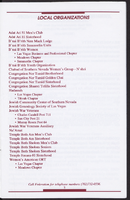Search the Special Collections and Archives Portal
Search Results

Isaac Barrón oral history interview: transcript
Date
Archival Collection
Description
Oral history interview with Isaac Barrón conducted by Maribel Estrada Calderón and Claytee D. White on March 27, 2019 for the Latinx Voices of Southern Nevada Oral History Project. Isaac Barrón was born and raised in Las Vegas, Nevada. His father entered the United States as a Bracero. Barrón attended Rancho High School and earned his bachelor's degree in secondary education from UNLV. He currently teaches history at Rancho High School and serves as North Las Vegas' Councilman. In this oral history, Barrón recalls his youth in North Las Vegas, navigating the presence of gangs, and his path to being a community activist and advocate for North Las Vegas youth. He has led volunteer efforts for community improvement projects, including the plans for a new public library. He holds the distinction of being the first Latinx member of the North Las Vegas City Council and Southern Nevada's first Hispanic Mayor Pro Tempore. In 2013, he was elected to represent Ward 1 and was reelected for a second term in April 2017. He discusses being Mexican American, the Coalition of Pan American Organizations, the Hispanic Student Union, the Bracero Program, and Rancho High School.
Text
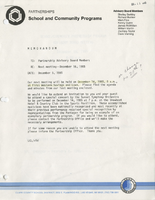
Documents related to the Clark County School District School-Business Partnership Program, 1983-1986
Date
Archival Collection
Description
These documents describe the need for the Clark County School District School-Business Partnership and a schedule for accomplishing specific activities. Mark Fine was the chairman for the partnership advisory board.
Text
Vaughn M. Higbee oral history interview
Identifier
Abstract
Oral history interview with Vaughn M. Higbee conducted by Mark Vandamme on March 31, 2004 for the Public School Principalship Oral History Project. In this interview, Higbee reflects upon his career as a sports coach, teacher, and administrator in Idaho and in Nevada’s Lincoln County School District (LCSD). He describes the process by which he became a coach, and then explains how his coaching experience shaped his approach to school administration. He describes his regular responsibilities and challenges as principal, and discusses his working relationships with teachers, fellow administrators, and the Board of Education. He also discusses how he chose to retire after serving as LCSD’s superintendent.
Archival Collection
Gertrude Toston oral history interview
Identifier
Abstract
Oral history interview with Gertrude Toston conducted by Claytee D. White on July 21, 2006 for the UNLV @ 50 Oral History Project. Toston discusses attending the University of Nevada, Las Vegas (UNLV) in the 1960s. She also discusses working as a customer service representative for Western Airlines for 27 years before going back to UNLV to work on her master's degree in special education. She then talks about working as a graduate teaching assistant and student teacher advisor at UNLV and as a teacher at Brinley Junior High.
Archival Collection
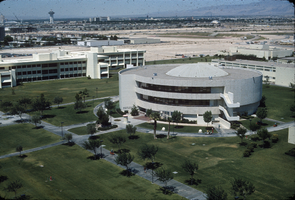
Slide of University of Nevada, Las Vegas, circa 1970s
Date
Archival Collection
Description
Image
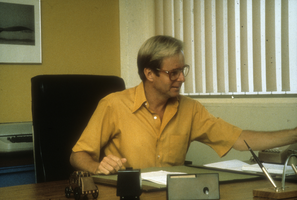
Slide of Richard Kunkel, circa 1970s
Date
Archival Collection
Description
Image
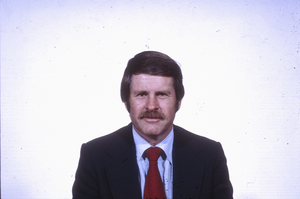
Slide of Dwight W. Marshall, circa 1970s
Date
Archival Collection
Description
Image
Lucile Nyberg oral history interview
Identifier
Abstract
Oral history interview with Lucile Nyberg conducted by Alison Hartough on February 22, 1978 for the Ralph Roske Oral History Project on Early Las Vegas. In this interview, Nyberg discusses the history of Overton, Nevada and life in the town. Nyberg describes early Las Vegas, Nevada and life in Boulder City, Nevada. Nyberg goes on to discuss her career as a teacher and the changes made to education in Las Vegas. Nyberg also discusses the development and the economy of Las Vegas, and briefly discusses prostitution in the city. Nyberg's husband, Richard Nyberg, is present during the interview, but does not speak.
Archival Collection
University of Nevada, Las Vegas College of Business and Economics Records
Identifier
Abstract
The University of Nevada, Las Vegas College of Business and Economics Records (approximately 1969-1998) contain documents created by the College of Business and Economics and the Center for Economic and Business Research at the University of Nevada, Las Vegas. Materials include economic impact reports, student handbooks, accreditation self-evaluation reports, business surveys, activity reports, memoranda from the Dean's office, and copies of Lieder, a publication created by the Lied Institute of Real Estate Studies and published by the College of Business and Economics.
Archival Collection

